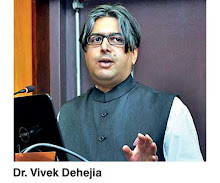Now, as it happens, I wrote a paper on the same subject when I was on sabbatical in India last year, but gave it the more equivocal title, "Democracy and Development: Friends or Foes"? (Mine wasn't published in Foreign Affairs, more's the pity.) Now mine you can read for free. It's a Carleton working paper. Here's the link:
Now, there's general consensus that one can find a partial correlation relationship between the level of economic development (measured, say, by per capita national income) and the level of democractization (that's a trickier one to measure, but there are several indices, based on things like free and fair regular elections, free press, independent judiciary, etc.). By "partial correlation", I mean, holding other relevant factors constant, more developed economies tend also to be (more) democratic. This begs the question, is there a causal relationship underlying this correlation, or is the finding purely spurious? There are a variety of theories arguing each direction of a putative causal link. Some theories say thay that being democratic is good for development: people are more likely, say, to be entrepreneurial and take risks, thereby leading to more rapid development, if there's living in a free society. Other theories say that democracy is a "normal" good (in the economist's sense, that we demand more of it as we get richer), so that, the more developed a country is, the more likely it is that people are going to demand democracy. The latter is a rough and ready version of the classical political science argument, articulated by Seymour Lispett, amongst others, that economic development leads to the growth of a middle class, who in turn demand democratic reform (assuming that the development took place in an autocratic society).
There is another version of this argument, that I like, put forward by libertarian economists such as Friederich von Hayek, Milton Friedman, and Lord (Ralph) Harris. This argues that, in the long run, you cannot have a "free economy" without also having a "free society" (bearing in mind all of my previous caveats about the use and misuse of the word "free"). The two are inextricably linked, the argument goes. Try to have economic development, without democracy, and eventually pressures and contradictions will build up within the society that will lead to democratization (hopefully peacefully, but perhaps through violent revolution).
Now there are several exemplary cases of a transition from autocracy to democracy, mediated by economic development. South Korea and Taiwan come to mind in East Asia, as do several countries in Latin America, most notably, of course, Chile. Chile went through liberal or "neoliberal" (a term I don't like, but it's widely used in political science and development circles - why the neo?) economic reforms under the brutal Pinochet dictatorship. But it did eventually democratize, and is now, most observers would agree, the most stable and successful democracies in Latin America. It is fair to ask whether the process by which Chile got to where it is, and the egregious human rights violations that took place under Pinochet and his regime tarnish in an important way the current success of that country. To many observers, on the left in particular, Chile paid too high a price, while others, notably on the right, are more sanguine (especially as none of them had to suffer or die at the hands of Pinochet's goons). Without wanting to get into the ethical debate (that's for another time, perhaps), I just note that the prediction (development leads to democracy) worked in this case, as, indeed, Friedman predicted at the time.
What is also clear from recent experience is that democracy, imposed at the barrel of a gun (ironic and preposterous as that proposition is), does not work. Afghanistan and Iraq attest to that. End of story. Unless democracy arises organically, from within a society, it's not going to take root, and may be a democracy in form but not in spirit or substance (i.e., elections take place, but the same guy always wins). Russia's backsliding from democracy into autocracy, under Tsar Vladimir, attests to this latter point.
The elephant in the room, of course, is China. So far, China's managed to buck the trend, and develop very rapidly, under a tightly controlled autocratic system, in which the Chinese Communist Party has refused to yield its monopoly in power, its opponents are jailed, and human rights violations are egregious and ubiquitous. The trillion dollar question is: Will China manage a peaceful transition to a more democratic system, or will the country implode as the party tries tooth and nail to keep its iron grip on power, and simmering protests from below eventually overwhelm the power of the state and lead to anarchy and chaos. Doomsayers about China, including me, have predicted this for a while, and we've been proved wrong so far. But now, with the global economy in a tailspin, Chinese exports plummeting, and Chinese growth decelerating, there's less "stuff" around that the Communists can use to bribe its populace with, and less to dangle in front of political opponents who need to be co-opted and brought into the system. So my prediction again is that change is on the horizon for China. I hope it's peaceful, but it may not be.

No comments:
Post a Comment